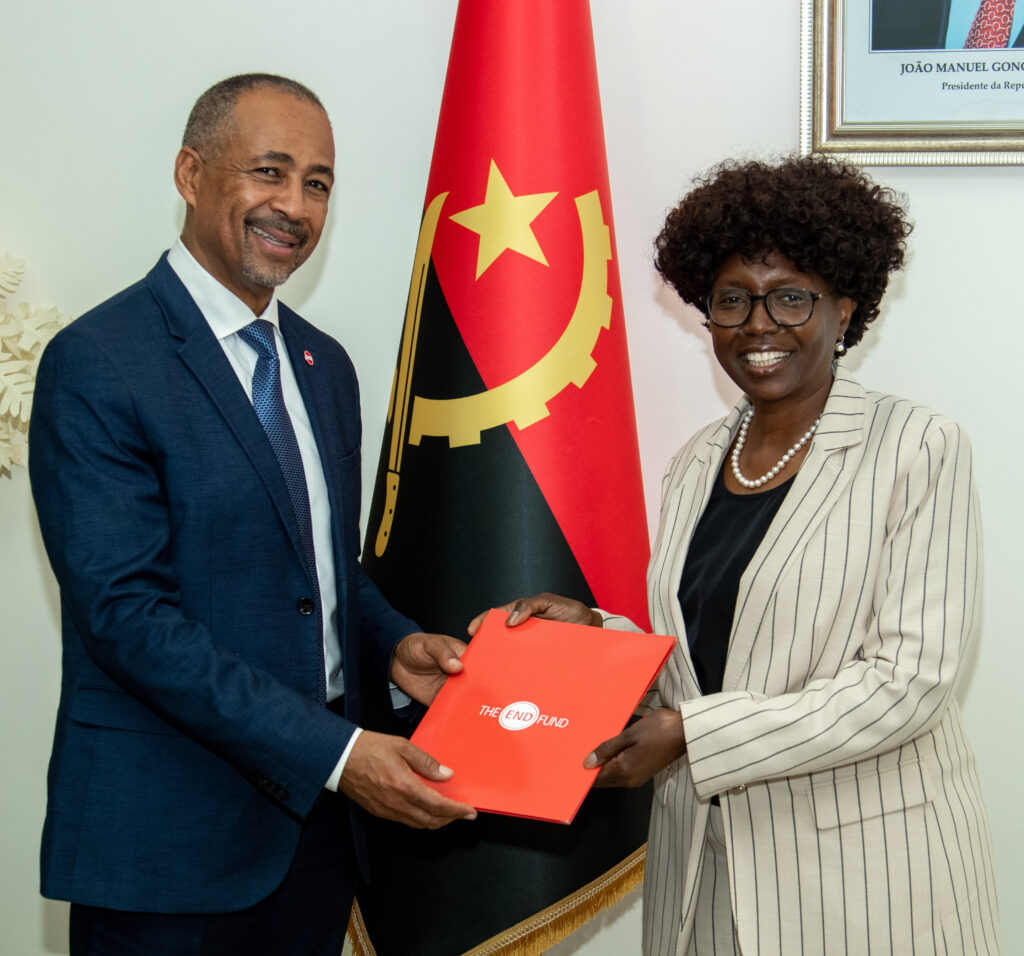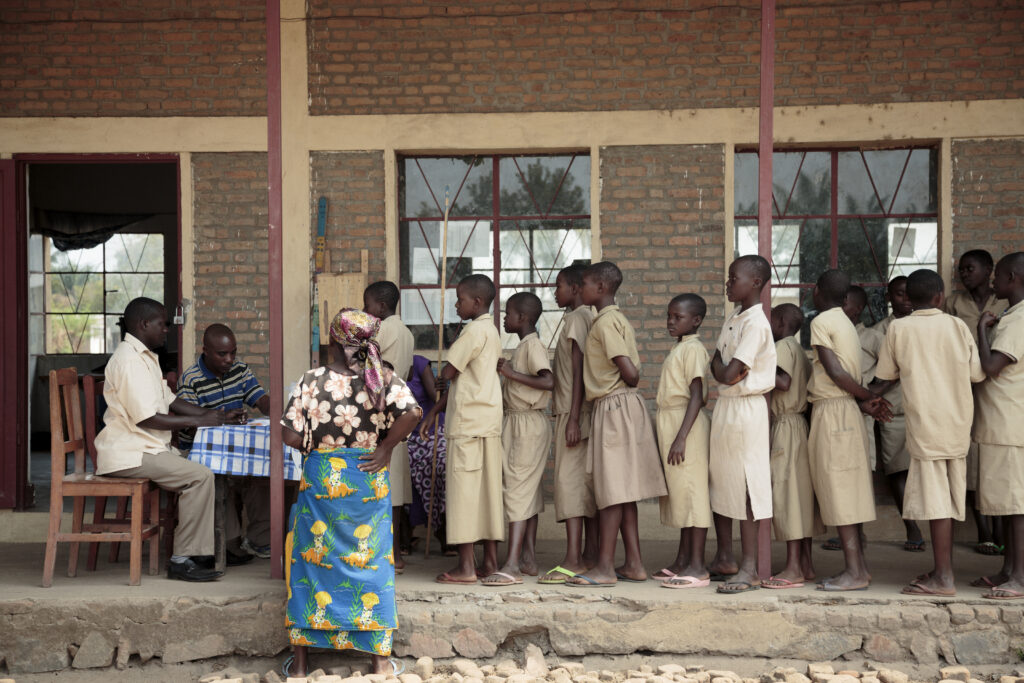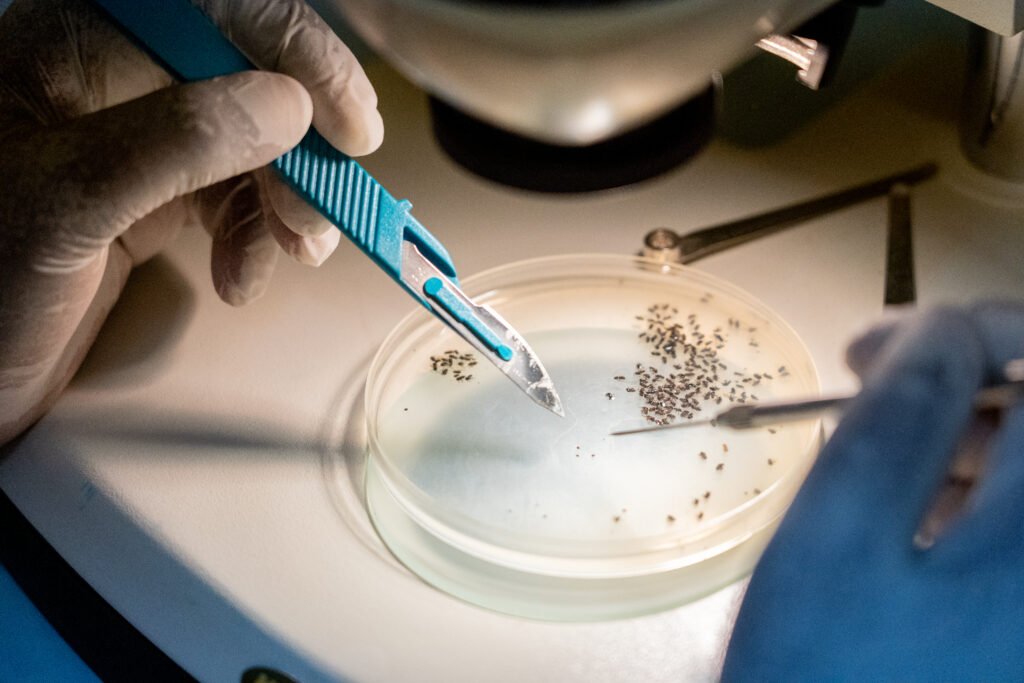
Dr. Solomon Zewdu and Dr. Silvia Lutucuta, Angola’s Minister of Health pose for a photo.
Angola
Building a Sustainable Path to NTD Elimination: Angola’s Movement to Strengthen Health Systems
– October 30, 2025
Angola is charting a new course in the effort to eliminate neglected tropical diseases — one rooted in integration, collaboration, and national ownership.
Last week, END Fund CEO Dr. Solomon Zewdu alongside long-standing partner, MENTOR Initiative, met in Angola to meet with the Ministry of Health to advance a shared vision: a sustainable, integrated, and locally driven approach to eliminating neglected tropical diseases.
Angola has made steady progress in expanding access to treatment for diseases like schistosomiasis, onchocerciasis, and lymphatic filariasis. Yet, the next phase of progress will depend on deepened coordination across sectors, sustained domestic investment, and stronger engagement at the provincial level.
“Our visit to Angola represents more than a decade of partnership in the work towards NTD elimination. Since 2013, the END Fund and its community of donors has supported the delivery of over 36 million treatments. As we meet with Angola’s leadership, including the Minister of Health and other key officials, partners like MENTOR, WHO and UNICEF, we’re advocating for the architecture that will position Angola as one of the countries that would reach the WHO elimination milestone of 2030: full integration of NTD programs into the broader health system and a multi-sectoral activity, greater domestic investment efficiency and effectiveness and country ownership,” says Dr. Zewdu. “We must avoid wastage. Advocacy, policy changes and streamlining resources are key in achieving efficiency and these must be prioritized. Static annual planning is not the solution since nothing remains constant. That’s the conversation we’re here to advance.”
Integrating NTD Programs Across Health Systems
One of the central themes of the week’s discussions was multi-sectoral integration — ensuring that NTD activities are woven into Angola’s broader health initiatives.
The Ministry’s National Strategic Plan for NTDs already recognizes integration as a core pillar. By aligning NTD interventions into like-minded health initiatives like malaria control, inoculation campaigns, maternal and child health, and WASH programs, Angola can sustainably expand impact while reducing strain on health workers. Dr. Silvia Lutucuta, the Minister of Health in Angola, affirmed that Angola is investing significantly in human capital – admitting new health professionals and strengthening training in primary health services. She reaffirmed the Government’s commitment to eliminating NTDs by 2030, in line with the goals set by the World Health Organization (WHO).
Integration also extends to drug delivery. Coordinating treatments for schistosomiasis and lymphatic filariasis can minimize campaign overlap, save resources, and reach more people in the remote regions.
Mobilizing Domestic Resources and Strengthening Provincial Leadership
Sustaining progress against NTDs will require strategic investment and provincial-level ownership. Recent years have shown promising signs of engagement from local governments in supporting mass drug administration campaigns — the END Fund and its community of donors has supported the delivery of more than 36 million treatments in Angola since 2013.
“Angola has 16 of the 21 diseases classified as NTDs. While progress has been made, elimination remains a long-term goal. Ongoing disease outbreaks place significant strain on health resources, creating competition for funding that could otherwise advance NTD control. In this context of constrained resources, partnerships become not just valuable, but essential. WHO is committed to working alongside the Ministry of Health, END Fund, and other partners to build integrated approaches that maximize impact. However, reaching elimination will require a higher level of sustained commitment from government, not just in financing, but in policy prioritization, provincial coordination, and multi-sectoral action. The foundations are strong; now we must build on them with urgency and resolve.” Dr. Indrajit Hazarika, WHO Representative in Angola.
In 2023, Angola allocated 6.7% of the total government state budget to health, the largest health budget in the country’s history – a undeniable sign of the government’s commitment to tis population health. A trend that can be scaled, effectively programmed and expanded to other sectors contributing to determinants of health.
Aligning Efforts Across Sectors and Partners
Angola’s success will also depend on alignment across international and local actors. Currently the WHO, World Bank, and UNICEF operate within Angola and have historically contributed to NTD activities or to the broader health administration system. By co-planning, co-financing and working in coordination — aligning objectives, sharing data, and pooling funds — collective impact can sustainably multiply.
While Angola’s NTD program continues to grow, achieving full nationwide disease elimination remains a goal that will require rethinking the models of engagements and partnerships. Yet, the foundations for success are there. With continued momentum toward program integration and greater resource programming effectiveness and mobilization, Angola is poised to expand its reach and strengthen the sustainability of its NTD elimination efforts.
Read more about the visit here.




